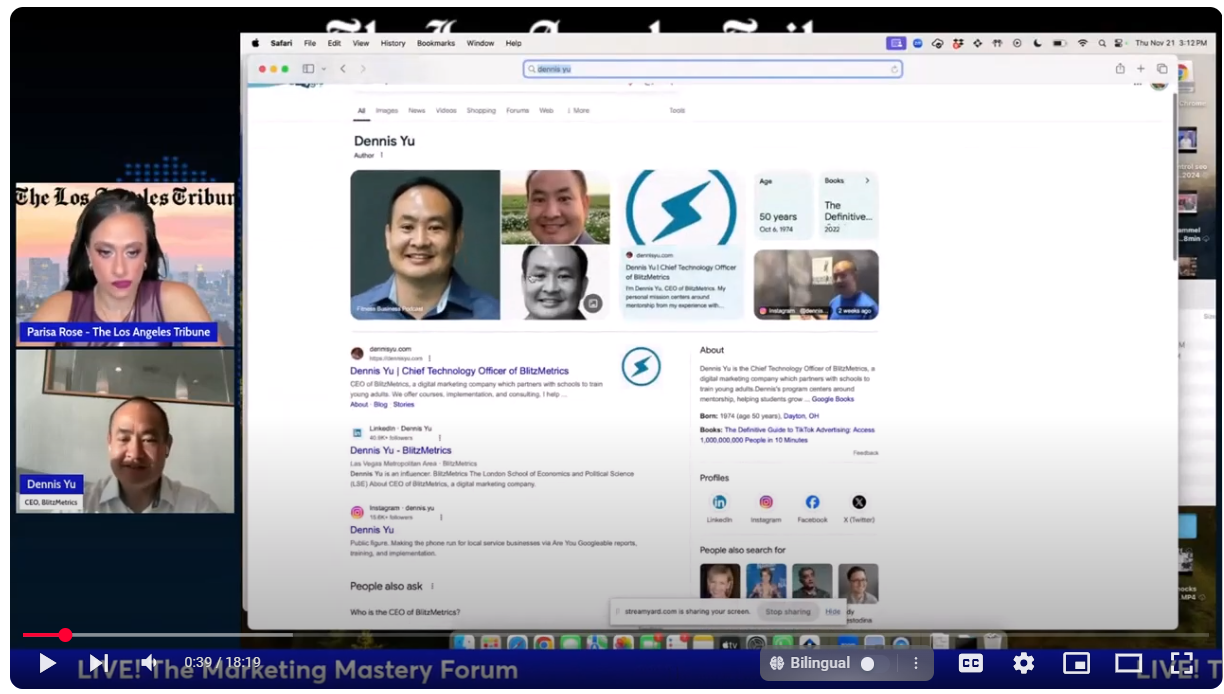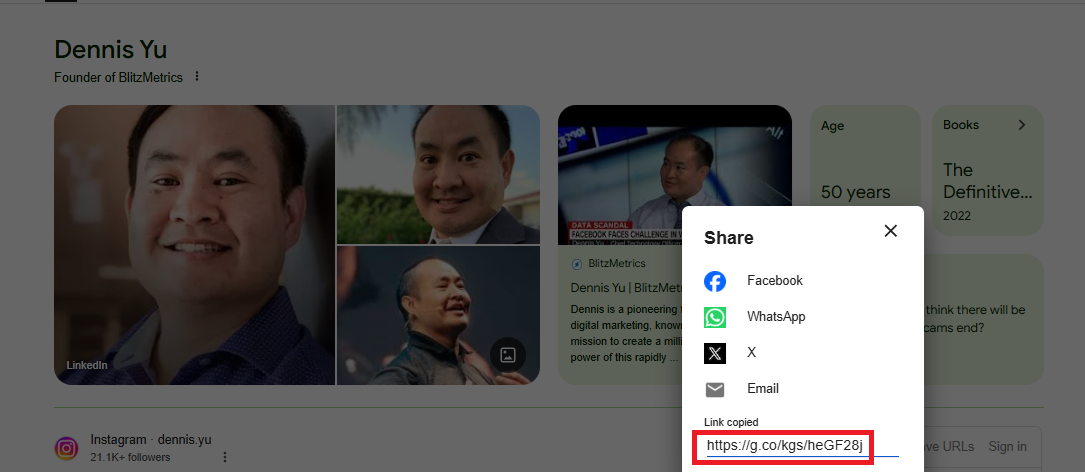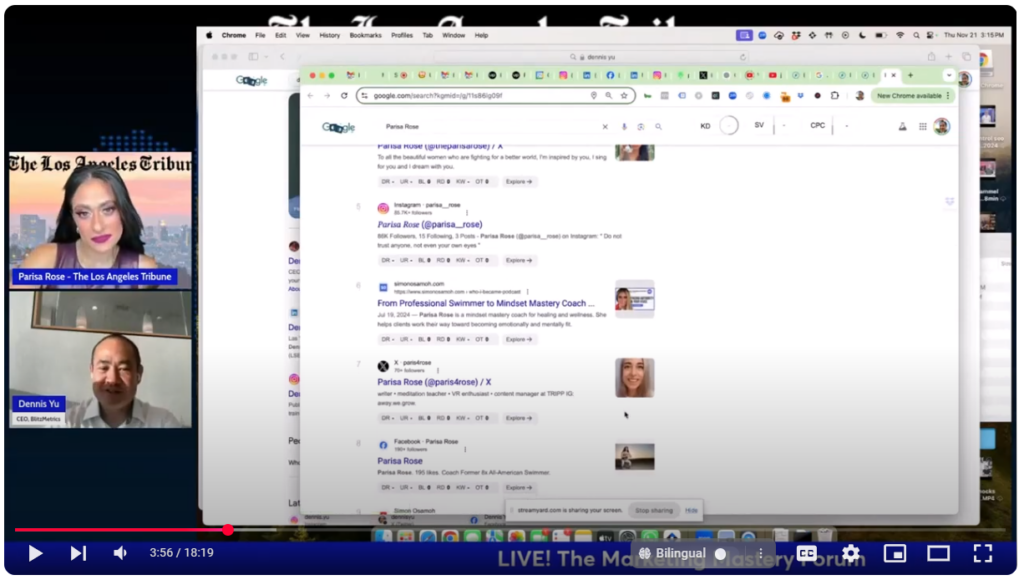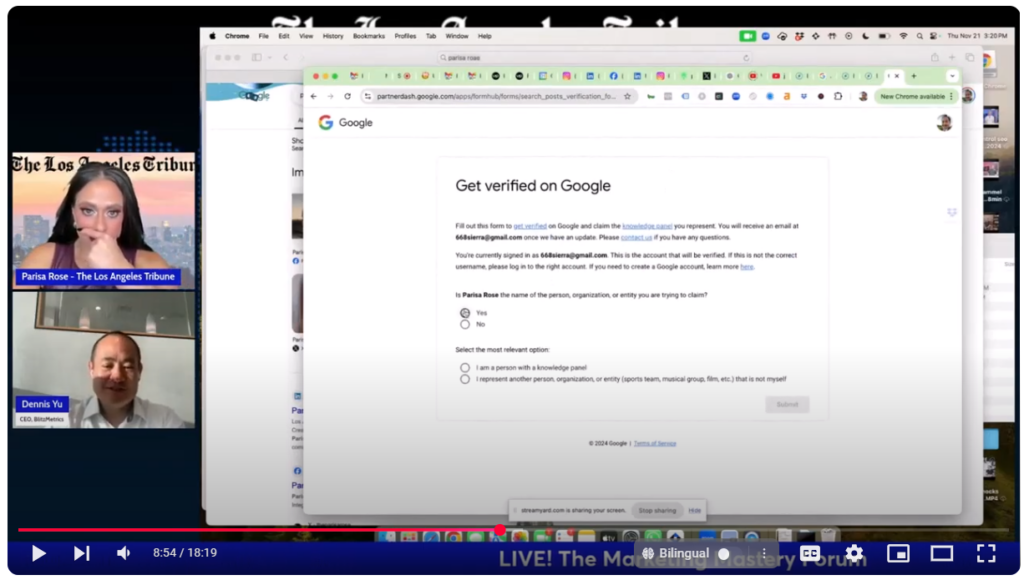A crucial aspect of online visibility is how Google structures information and how you can leverage that to dominate search results. Your personal brand isn’t just what you say about yourself; it’s what Google and others say about you.
As I was setting up for this session, I had a brief technical hiccup, and I thought, “Well, this is just technology being technology.” But that’s exactly what marketing and branding are about—adapting, learning, and ensuring that no matter what, people recognize your name and expertise when they look you up.
The Power of the Knowledge Panel
When you look me up on Google, you’ll find my Knowledge Panel. It’s that structured box with my bio, my social links, related searches, and even posts associated with me. You see that colored box with an upside-down L-shape?

That’s my digital identity in Google’s ecosystem. It includes information about my company, BlitzMetrics, and common queries associated with my name, like Content Factory and the Dollar-a-Day strategy.
But here’s something important to understand — there are many people named Dennis Yu. There’s a professor at Clarkson University, a Hong Kong film director, and a marketing executive in Silicon Valley.
Despite that, I dominate search results for my name. The reason? I’ve systematically structured my online presence so that Google knows exactly who I am and what content is relevant to me.
How Google Identifies and Categorizes Individuals
Google assigns an ID to every entity it recognizes, similar to a social security number. Mine, for example, is coded in the backend of Google’s Knowledge Graph as “heGF28j.”

This ID is critical because Google needs to differentiate me from others with the same name.
When I first realized how Google categorizes people, I was working at Yahoo! nearly 25 years ago.
Back then, we were building analytics systems to classify massive amounts of data, and I remember thinking, “Wow, 99.9% of the internet is just noise — how do we extract useful data?” This is still Google’s biggest challenge today, and if you don’t structure your online presence properly, you’re just part of that noise.
How Confidence Scores Affect Your Google Visibility
I pulled up Parisa Rose during the event, and what did we find? Google was about 85% confident that the results it displayed belonged to her. That means there was still some ambiguity.
“So, did you know there are 14 other Parisa Roses out there?” I asked her. She didn’t! That’s the issue.
If your identity is unclear, Google won’t give you a full Knowledge Panel, and you risk losing visibility. Google might merge your identity with another person’s or not show your panel at all.

To increase Google’s confidence in your identity:
- Ensure all major social accounts and websites are interlinked.
- Publish consistent content under your name across multiple platforms.
- Claim and verify your Knowledge Panel.
Why Claiming Your Knowledge Panel Matters
Most people don’t know this, but Google allows you to claim your Knowledge Panel. This is not the same as getting verified on Instagram or TikTok, where you need a certain number of followers or press coverage.
Claiming your Knowledge Panel is entirely free and establishes you as a verified entity in Google’s database.
To claim yours, follow these steps:
- Search your name on Google.
- Click the three-dot menu in the top right corner of your Knowledge Panel.
- Select Claim this Knowledge Panel.
- Google will ask you to verify your identity using official documents, website ownership, or social media logins.
- Submit fact-based information about yourself—your business, books you’ve authored, major speaking engagements, and other verifiable data.

Many people get rejected during this process because they fill out the form incorrectly. I’ve helped countless friends do this, and the most common mistake is providing opinions instead of facts.
If Google asks why you want to claim your panel, don’t say, I’m a best-selling author or I’m a successful entrepreneur.
Instead, say I wrote [Book Title], published on Amazon, and featured in Forbes—Google wants data, not fluff.
Structuring Your Online Presence the Right Way
If Google is unsure about your identity, your Knowledge Panel won’t display correctly. You need to make it easy for Google to connect the dots. Here’s how:
- Use the same name format across all platforms. If your name is “John A. Smith” on LinkedIn, don’t use “Johnny Smith” on Facebook.
- Link all your major social media accounts to your website.
- Contribute to authoritative sources—guest blog on high-ranking websites, get featured in interviews, and get listed in reputable directories.
- Avoid spammy tactics. Fake followers and black-hat SEO tricks will backfire in the long run.
A Step-by-Step Guide for Verification
Most people fail this step because they provide vague or unverifiable information. If Google asks why you’re claiming a Knowledge Panel, here’s what you should say:
- I am the founder of [Your Company], officially listed on [Business Directory or Website].
- I have authored [Book Title], available on Amazon and Barnes & Noble.
- I have spoken at [Conference Name], which is documented on YouTube and event sites.
The key is factual, objective statements that Google can cross-reference. If you say, I’m the best marketer in the world, that’s an opinion — Google won’t accept it.
Why This Matters for Your Marketing Strategy
People often ask if this process is only for celebrities. Absolutely not. Whether you’re an entrepreneur, coach, consultant, or executive, structuring your online identity is crucial. If people can’t find you easily on Google, you’re losing business.
Think about it—if someone is deciding between you and a competitor, and their Google search pulls up a complete, verified profile for your competitor but fragmented results for you, who do you think they’ll trust more? Being Googleable isn’t about vanity — it’s about business credibility.
Conclusion
Instead of trying to game the system with shortcuts, focus on structuring your online presence authentically.
I’ll be diving deeper into this topic at Quantum Leap 2025 on January 9-11. If you want a live, step-by-step walkthrough on optimizing your online presence, be sure to tune in. And if you’re serious about being Googleable, go claim your Knowledge Panel today!